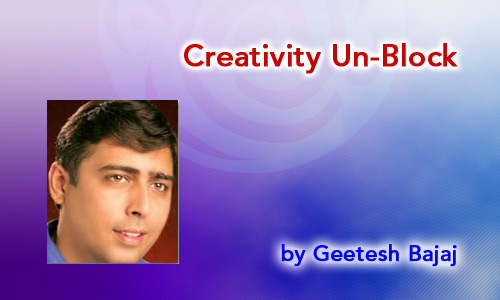Author: Geetesh Bajaj
A Creativity Block?
Diagnose And Resolve
Instances
Observations
An Invitation For Involvement
Related Links
Imagine a flow - a flow of thoughts, translated onto the paper papyrus or the electronic screen or another media like a loom or canvas - ideas, theories and designs, at times when your mind thinks faster than your hands could use your pen, needle, brush, typewriter or keyboard. A state of consciousness when your creative juices are in full flow and an exact opposite of what we term 'the creativity block'!

The creativity block - it unfailingly happens to all of us, sometimes sooner than later. There are many reasons for it to happen, and they are as varied as we all are, leading their ways from circumstances, happenings and events - known and unknown. The most difficult stumble in removing the creativity block is to identify the reason in the first place.
Since it can be so near-impossible to diagnose the problem, it's best to look at other ways to resolve the block. One of the most effective ways is distraction. Distraction always removes us from existing attractions - and it was one of these attractions, which caused the creativity block in the first place. In effect, you never realized the cause of the block, yet you would be successful in remedying the problem.
It certainly is easy to use the word 'distraction' here, but causing an intentional distraction to your own self is easier said than done. Each of us has different interests, also our creativity blocks themselves are varied in the first place. One of you may be a painter, another could be a writer, poet or fashion designer. Or maybe you're a computer programmer or a scientist. It's quite understandable that the distraction theory has to be applied differently in each case. That itself isn't the end of the story: at times you may have to distract yourself from your intended field itself.
Let's examine a few instances.
There's this painter, who usually is a brilliant exponent of his chosen genre of painting. When faced with a creativity block, it would be natural for most of us suggest that he visit a museum or read a good book. Yet, he does something radically different - like going for a movie, a long drive or maybe even washing his car.
For another example, let's consider this web designer: when the dreaded creativity block confronts her, she looks (not reads) at design books, imagines colours and textures - this almost always sets her creative juices flowing. Many of us aren't as lucky as her.
As we observed, different people have their own ways of removing their creativity blocks - some are obvious, other are not so obvious and yet others are of the 'never - imagine - in - a - thousand - years' genre.
At all times, it can be very interesting and rewarding to find out ways in which people cure their creativity blocks. This way, we can learn more - and at the same time, maybe we could ascertain the causes of a few of our own creativity blocks. What would that be like? A type of workbook to fill in experiences? A set of examples and theories to put into practice for ourselves and everyone else?
Walter Donavan, who runs the 7Stages site, has sent his observations - which cover professional creativity blocks ranging from those concerned with writing or graphics - but his words are universal - I'm sure you all will derive benefit from them. Read here.
Kathryn Jacobs is a trainer, girl scout, parent, and whatever else there is time for. She's also a BrainBench MVP for Microsoft PowerPoint. She has graciously penned down an exclusive article for this site - Breaking The Brain Block. Read here.
It would be great to hear from you all for this ongoing project - the Creativity Un-Block Project - do send your ideas and problems so that this section can be expanded to help us all. Contact through the feedback form.
The Mind Tools site has plenty of advice to get your creative juices flowing.
Robert Alan Black has written a great 'self-questioning' article on Breaking Creativity Blocks. His site at Cre8ng People, Places and Possibilities has lots of information you could use.

Microsoft and the Office logo are trademarks or registered trademarks of Microsoft Corporation in the United States and/or other countries.